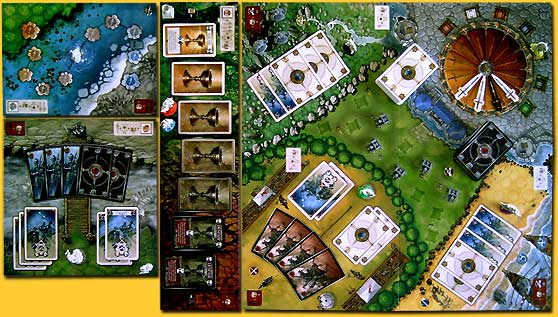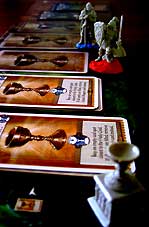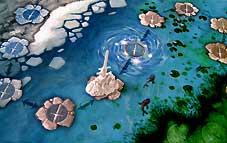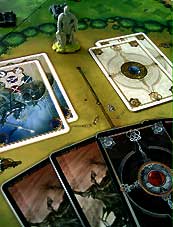Shadows over Camelot
page 2
| x |
|
|
|
|
|
|
|
|
|
|
|
|
|
|
|
|
|
|
|
|
|
|
|
|
|
|
|
|
|
|
|
|
|
|
|
|
|
|
|
|
|
|
|
|
|
|
|
|
|
|
 |
| x |
|
|
|
|
|
|
|
|
|
|
|
|
|
|
|
|
|
|
|
|
|
|
|
|
|
|
|
|
|
|
|
|
|
|
|
|
|
|
|
|
|
|
|
|
|
|
|
|
|
|
|
Now the game starts and the knights can go on their quest. On a turn a knight must:
• Perform an evil deed (the progression of evil)
• Perform a good deed (heroic action)
Among the evil deeds, the knight can freely choose between three options:
• Draw a black card from the black draw pile, read it and apply its (bad) effect
• Add a siege engine around Camelot
• Sacrifice a life (loose a life point, by decreasing the 'life die' by one)
The black cards will put a quest a step closer to defeat, which can be a reason to consider another of the possible options, and by doing so allowing another quest to finish victoriously.
After the evil is done, it is time for a good, heroic, action, where the knight has the following options:
• Move to a new quest
• Perform a ‘special’ good action (by playing a ‘special’ white card)
• Perform a normal action for a quest that is related to the location the knight is currently at (by playing one or more standard white cards)
• Accuse another knight of being the traitor (which is only possible later in the game).
By sacrificing a life (point) it is possible for a knight to perform another, but, different heroic action. When the life die is turned to zero however, the knight dies and is out of the game.
|
x |
|
| x |
|
|
|
|
|
|
|
|
|
|
|
|
|
|
|
|
|
|
|
|
|
|
|
|
|
|
|
|
|
|
|
|
|
|
|
|
|
|
|
|
|
|
|
|
|
|
|
|
|
|
 |
|
The choices are primarily determined by the current situation of all quests, not only of the player’s knight, but also of the others. In total there are six real quests, but the knights can also choose to stay on Camelot, either to obtain strength (draw white cards), or fight the siege engines around Camelot in a more or less brave way.
|
x |
 |
| x |
|
|
| When a knight wants to fight, he can commit himself to one of the following quests: against the Picts, Saxons, the Black Knight, or Sir Lancelot, but if he finds himself attracted to magic, he can pursue the quests for the Holy Grail or Exalibur’s Sword. Each quest requires its own (white) cards, and a specific combination of white cards is required for victory. |
|
| x |
|
|
|
|
|
|
|
|
|
|
|
|
|
|
|
|
|
|
|
|
|
|
|
|
|
|
|
|
|
|
|
|
|
|
|
|
|
|
|
|
|
|
|
|
|
|
|
|
|
|
|
King Arthur: [after Arthur's cut off both of the Black Knight's arms] Look, you stupid Bastard. You've got no arms left.
Black Knight: Yes I have.
King Arthur: *Look*!
Black Knight: It's just a flesh wound.
|
|
|
|
|
|
|
|
|
|
|
|
|
|
|
|
|
|
|
|
|
|
|
|
|
|
|
| x |
|
|
|
|
|
|
|
|
|
|
|
|
|
|
|
|
|
|
|
|
|
|
|
|
|
|
|
|
|
|
|
|
|
|
|
|
|
|
|
|
|
|
|
|
|
|
|
|
|
|
 |
|
A player’s hand of cards determines the choice for a specific quest and action. In the beginning this may feel like a quest by itself, but soon it becomes clear that when a quest is close to victory, it may be better to claim this victory by sacrificing a life and perform another heroic action. These kind of choices is of course influenced by numerous advice from the other players/knights, including possible traitorous ones.
Whenever a 'normal' black card is drawn as an evil deed, Camelot can typically survive without a problem, but in case of a 'special' (really evil) one, things can become troublesome, and Merlin will have to be called to save the day: by collectively playing three Merlin cards (special white cards) players can cancel the effect of that special black card.
|
| x |
|
|
|
|
|
|
|
|
|
|
|
|
|
|
|
|
|
|
|
|
|
|
|
|
|
|
|
|
|
|
|
|
|
|
|
|
|
|
|
|
|
|
|
|
|
|
|
|
|
|
| x |
|
|
|
|
|
|
|
|
|
|
|
|
|
|
|
|
|
|
|
|
|
|
|
|
|
|
|
|
|
|
|
|
|
|
|
|
|
|
|
|
|
|
|
|
|
|
|
|
|
|
 |
|
|
|
|
|
|
|
|
|
|
|
|
|
|
|
|
|
|
|
|
|
|
|
|
|
|
|
|
|
|
|
|
|
|
|
|
|
|
|
|
|
|
|
|
|
|
 |
|
|
|
|
|
|
|
|
|
|
|
|
|
|
|
|
|
|
|
|
|
|
|
|
|
|
|
|
|
|
|
|
|
|
|
|
|
|
|
|
|
|
|
|
|
|
 |
|
|
|
|
|
|
|
|
|
|
|
|
|
|
|
|
|
|
|
|
|
|
|
|
|
|
|
|
|
|
|
|
|
|
|
|
|
|
|
|
|
|
|
|
|
|
 |
|
|
|
|
|
|
|
|
|
|
|
|
|
|
|
|
|
|
|
|
|
|
|
|
|
|
|
|
|
|
|
|
|
|
|
|
|
|
|
|
|
|
|
|
|
|
| x |
|
|
|
|
|
|
|
|
|
|
|
|
|
|
|
|
|
|
|
|
|
|
|
|
|
|
|
|
|
|
|
|
|
|
|
|
|
|
|
|
|
|
|
|
|
|
|
|
|
|
 |
|
|
|
|
|
|
|
|
|
|
|
|
|
|
|
|
|
|
|
|
|
|
|
|
|
|
|
|
|
|
|
|
|
|
|
|
|
|
 |
|
|
|
|
|
|
|
|
|
|
|
|
|
|
|
|
|
|
|
|
|
|
|
|
|
|
|
|
|
|
|
|
|
|
|
|
|
|
|
|